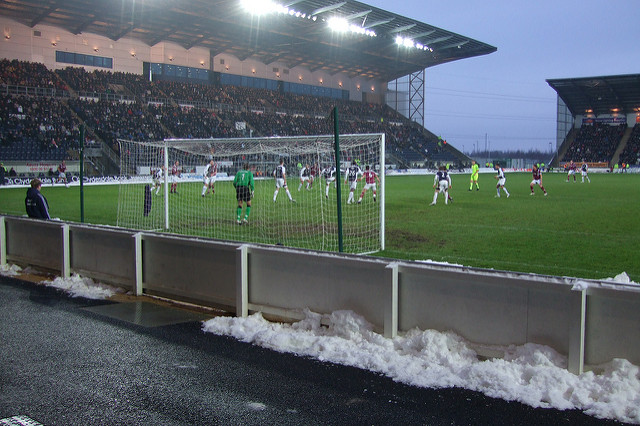Falkirk are a mid-table club. Those were the words of current Falkirk FC CEO Craig Campbell at a recent fans’ forum event. And that is the attitude many fans feel has permeated the whole club over the past few years: content with making the play-offs, agnostic about promotion.
In case you haven’t been following recent developments from the Falkirk Stadium, the club has, sitting ninth in the Scottish second tier, parted company with manager Peter Houston.
This move was widely supported by fans. Under Houston there were three moderately successful seasons (including a Scottish Cup final, two 2nd-place finishes and a play-off final), but this season has been disastrous. A pre-season League Cup campaign consisting of four straight wins became a league season that generated just three points from 21.
Houston was not a bad manager for Falkirk on paper. As well as the cup and play-off finals, there were exciting wins against three of Scotland’s largest clubs: Glasgow Rangers, Heart of Midlothian, and Hibernian. However, there is no prize in football for the runners-up. Houston, despite those relative successes, did not actually achieve anything tangible during his time at the club.
Additionally, there was a frustration among many Falkirk fans about both his signing policy and his signing record. During his more than three years at the club, Houston signed only three players who had not previously played in Scotland.
Of these, one was decried as one of the worst strikers in Falkirk’s history, having been signed on a tip-off from a friend of Houston. The other two were reserve goalkeepers who made four appearances between them.
Except for this sparkling trio, the rest of Houston’s signings were all from other Scottish clubs. Considering the standard of Scottish football is not exactly world-class at the moment, this seems bizarre.
There is also the fact that many of Falkirk’s best players over the last decade have been signed from elsewhere. These include Premier League winner Kasper Schmeichel, Dutch World Cup quarter-final hero Tim Krul, and then Arsenal youngster Anthony Stokes.
Paul Hartley was this week appointed to replace Houston. The ex-Dundee manager has experienced promotion from the Scottish Championship before, so he should be a decent acquisition.
However, the real power base at the club isn’t in the dugout, but in the boardroom. It is there where promotion will be won or lost. Only last week, Houston revealed in a BBC radio interview that he had been promised last season by the Board of Directors that the club was “keeping its powder dry” for this season.
However, not only did this funding boost not materialise, but Houston had his first team budget cut this season. Whether it’s Houston or Hartley in the manager’s post, promotion will simply not be achieved unless the playing budget is increased.
It is simply not acceptable that the club which last year had the seventh highest average attendance in Scotland has now been languishing in the second tier for eight seasons.
The directors’ preaching of financial prudence makes sense given how close the club was to financial ruin in 1998. Considering that, however, additional investment must be found from either the existing shareholders or elsewhere to ensure one of Scotland’s largest clubs does not spend another eight seasons outside the Premiership.
Image courtesy of Tristram Biggs

